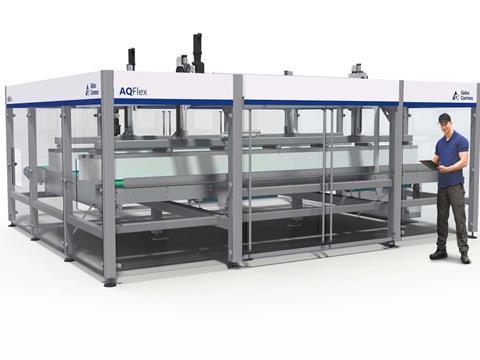
Emerging consumption patterns are raising new production challenges for manufacturers of beverage, food, home and personal care products around the world.
Product diversity, personalisation and e-commerce all demand increased responsiveness, flexibility and scalability from the production lines. With its breakthrough concept, the Sidel Group is paving the way to a new production model marked by unprecedented agility.
This agility first involves a significant simplification of the processes, then the ability to process high variability and low volumes in these less predictable times and environments. Answering these new consumption trends and e-commerce requirements, it provides mass customisation at the cost of mass production and is based on the concept of the 'dematerialised layout'.An end to unsustainable repacking
For many manufacturers today, the only way to answer the demand for more customised products and a variety of SKUs (stock keeping units) - such as rainbow packs, promotional packaging or smaller cases - quickly and at the right price is generally by a process of repacking finished products. These are unpacked and then repacked at a later date in another configuration. According to industry experts, this repacking process can sometimes account for 30 - 50% of total production volume and is completely contrary to the principles behind lean manufacturing and lowered carbon footprints. Figures like this clearly show that flexibility has reached its limit and that greater agility is required for markets where unpredictability is an increasing characteristic and where the challenge to produce a wide variety of different product types, often in limited numbers, is very real.
No similar ‘out-of-the-box’ solution available
As a consequence, order preparation integrated into production lines seems inevitable. This is the model the Sidel Group is proposing to its customers to help them be more flexible and reactive, as well as less wasteful.
According to the company’s new “dematerialised layout” concept, packaging lines will likely be remodelled. Individual equipment will continue to be used, but will no longer be linked from one to another. Alongside high-capacity and often single-format lines, there will be the possibility to assemble autonomous smart production islands - ‘cyber physical systems’, as they are known in Industry 4.0 jargon. They will communicate with their surroundings and will be loaded and unloaded via mobile platforms. It will mark the end of crossover conveyors, and inflexibility in layout plans. By doing this, the ultimate goal is to offer total freedom of flows and allow containers and packs to be directed from any point to any other: total flexibility, and so fewer format changeovers on machines and lines. Another consequential benefit is that by sharing machines throughout different lines - i.e. dematerialising the layout and reducing the number of machines required - contributions can be made across multiple production lines, thereby reducing CAPEX (capital expenditure).
Whilst the above principle can be used for unitary lots, another trend is disrupting production plans: packs containing different flavours (rainbow packs) or promotional packs (gift packs). Order preparation or zone picking stations will require access to all the products they need at any time to produce lots on demand. Given that changing format at the same rate as customised lots is not possible, the factory of the future will feature semi-finished product logistics on its production lines: routing, intermediary storage, availability on demand. This means no more re-packing, with the most variable groupings achieved using containers or product packs ahead of time which are then temporarily placed in reserve. Intra logistics will complete this architecture. This is what is known as the ‘Extended Factory’.
By adopting this lean approach of handling semi-finished goods and considering intra-logistics, producers in the food, beverage, home and personal care markets will be able to achieve maximum flexibility, improve performance over time and customise mass production. All of which while increasing the types of SKUs they are able to handle, achieving shorter times to market, reducing waste and storage and eliminating repacking needs.
Ludovic Tanchou, Vice President of Strategy, Products and Innovation, Gebo Cermex, comments: “With no comparable solution available on the market, the Sidel Group’s unique ‘dematerialised layout’ approach revolutionises traditional line and factory concepts for packaging producers by boosting flexibility, individualisation and late customisation opportunities. Using 3D modelling to design and assess customised line layouts and leveraging Gebo Cermex’s extensive expertise in advanced automation and line engineering, this approach to manufacturing makes future product portfolio extensions more easily implemented, with no compromises on equipment utilisation rates, better use of resources and, above all, optimised TCO (total cost of ownership). We had a very positive response at drinktec 2017, which, as the world’s leading trade fair for the beverage and liquid food industry, provided an excellent platform for the introduction of this breakthrough concept.”
The “Extended Factory” represents one of the five pillars on which the Sidel Group’s Agility 4.0™ programme is built. This is an award-winning, proven and pragmatic approach to manufacturing, which complements the opportunities offered by Industry 4.0, while also boosting them. It brings Smart Factories to life, to create a world of greater choice and unique consumer experience driven by packaging mass customisation and product diversity. All of this while optimising initial investments, keeping running costs low and securing agile performance over time.
More info:













